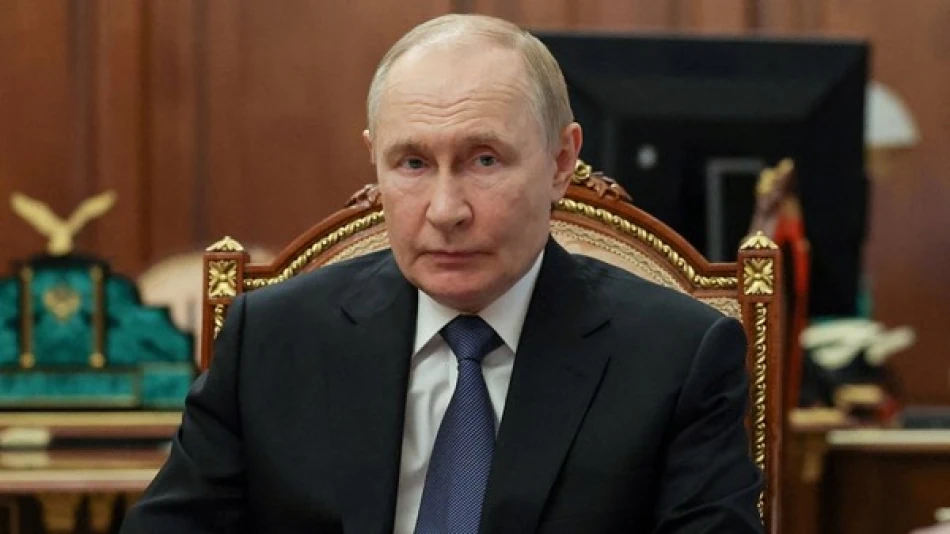
Putin Vows to Revive Vision for a New Global Order
Putin's China Visit Signals Accelerated Push for New World Order as BRICS Alliance Strengthens
Russian President Vladimir Putin is embarking on a four-day visit to China that observers see as a pivotal moment in reshaping global power dynamics. Speaking ahead of his departure, Putin declared his intention to revive the concept of a multipolar world system, with his upcoming meeting with Chinese President Xi Jinping expected to provide "additional strong momentum" toward this goal. The visit culminates in Putin serving as Xi's chief guest at a military parade in Beijing on September 3rd.
Shanghai Cooperation Organization Summit Takes Center Stage
The centerpiece of Putin's visit is the Shanghai Cooperation Organization (SCO) summit in Tianjin, southeast of Beijing. China, which currently holds the organization's presidency, expects representatives from 20 countries and 10 international organizations to attend what Beijing describes as the largest summit since the SCO's founding 24 years ago.
The SCO has evolved significantly from its original counterterrorism mandate to become a broader platform for economic cooperation and geopolitical coordination. The organization now includes 10 member states: founding members Russia, China, Kazakhstan, Kyrgyzstan, Tajikistan, and Uzbekistan, plus India, Pakistan, Iran (since 2023), and Belarus (since 2024).
Strategic Expansion Reflects Shifting Allegiances
The recent additions of Iran and Belarus are particularly significant. Iran's membership, formalized in 2023, brings a major energy producer and regional power under the SCO umbrella at a time when both Russia and Iran face extensive Western sanctions. Belarus's inclusion further solidifies the organization's role as a counterweight to Western-led institutions.
BRICS Leadership in the "Global South" Strategy
Putin emphasized that strengthening the Global South under BRICS leadership would be a crucial component of the emerging world order. This strategy represents a direct challenge to the G7 and traditional Western economic dominance, particularly as BRICS has expanded to include major economies like Brazil, India, China, South Africa, Russia, and recently added members including the UAE, Saudi Arabia, and Egypt.
The timing is strategic. As Western sanctions continue to impact Russia's economy, Moscow is doubling down on partnerships with non-Western powers. The BRICS bloc now represents over 40% of the global population and approximately 25% of global GDP, giving it substantial leverage in international affairs.
High-Stakes Diplomatic Marathon
The Kremlin describes Putin's visit as unprecedented in terms of duration, scope of meetings, and topics covered. Beyond his discussions with Xi, Putin is scheduled to hold talks with leaders from India, Turkey, Serbia, and Pakistan—a diverse group that reflects Russia's efforts to build bridges across different regions and political systems.
Economic Implications for Global Markets
This diplomatic push carries significant implications for global trade and investment patterns. The strengthening of alternative international frameworks could accelerate the development of parallel financial systems, potentially reducing reliance on dollar-denominated transactions and Western banking networks. For investors, this suggests continued volatility in traditional markets and potential opportunities in emerging market partnerships.
The "Unlimited Friendship" Deepens
Moscow commentators view this trip as further evidence of Russia's pivot away from the West and its deepening "unlimited friendship" with China. This relationship has proven remarkably resilient, with bilateral trade reaching record levels despite international sanctions. The partnership extends beyond economics to include military cooperation, technology sharing, and coordinated diplomatic positions on major international issues.
The military parade invitation underscores the symbolic importance China places on this relationship. Such gestures are rare in Chinese diplomacy and signal Beijing's commitment to the partnership despite potential complications with Western allies.
Implications for Global Power Balance
Putin's multipolar vision represents more than diplomatic rhetoric—it reflects a concrete strategy to create institutional alternatives to Western-dominated global governance. The success of this approach will largely depend on whether these emerging partnerships can deliver tangible economic and security benefits to member states while maintaining cohesion despite diverse national interests.
For Western policymakers, this development presents both challenges and opportunities. While the emergence of rival power blocs complicates traditional diplomatic approaches, it also creates incentives for more competitive and responsive international engagement strategies.
Most Viewed News

 Layla Al Mansoori
Layla Al Mansoori






